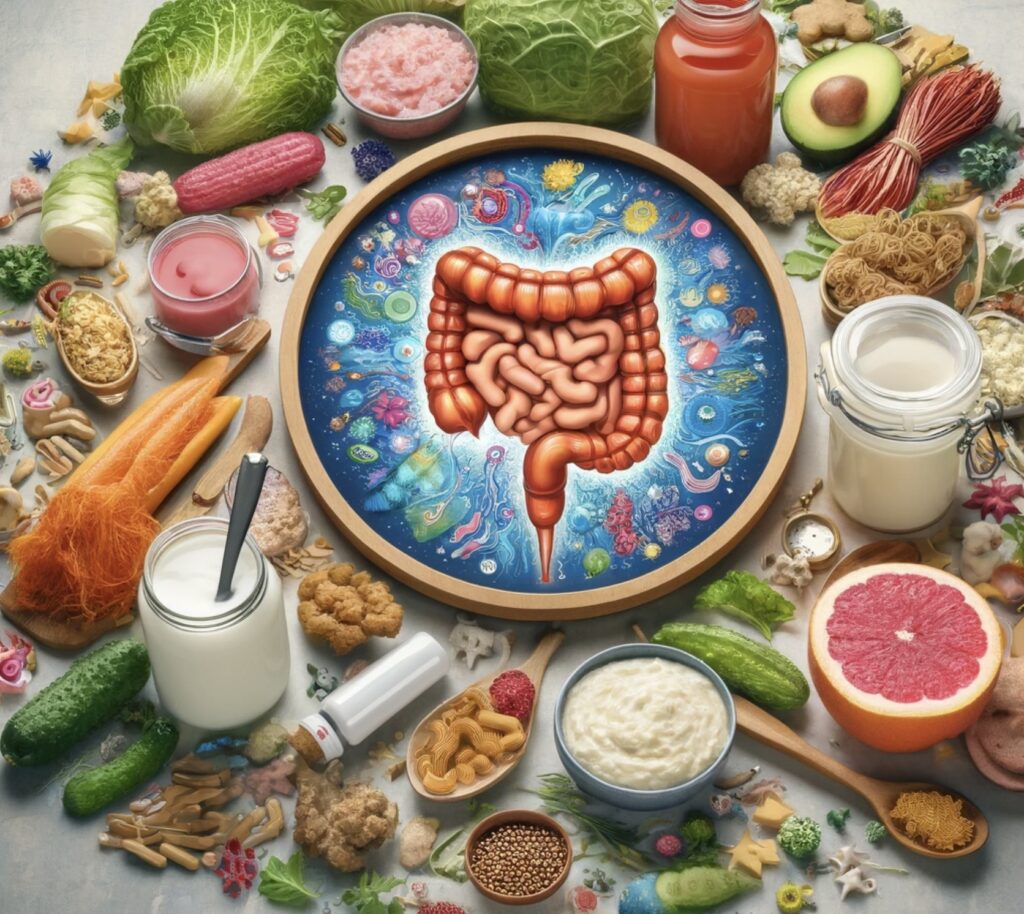Probiotics, often hailed as the guardians of gut health, have taken centre stage in the narrative of nutritional science and wellness. Their role extends beyond mere digestion aid, intertwining with the intricate workings of the immune system. This blog post delves into the multifaceted influence of probiotics on gut health and immunity, uncovering the science behind their beneficial effects.
Probiotics explained
Probiotics are live microorganisms that, when administered in adequate amounts, confer a health benefit on the host. These beneficial bacteria and yeasts are predominantly found in fermented foods such as yogurt, kefir, sauerkraut, kimchi, and kombucha, or as dietary supplements. They are known to enhance gut flora, or the microbiome, which is a complex community of microorganisms living in our intestines.
.

.
The gut microbiome: A central player in health
The gut microbiome plays a crucial role in the body’s overall health, affecting everything from digestion and nutrient absorption to immune function and even mental health. A balanced gut microbiome helps to break down food, synthesise vitamins, and protect against pathogens. Probiotics contribute to this balance, adding to the diversity and functionality of the gut’s microbial community.
Probiotics and gut health
The relationship between probiotics and gut health is symbiotic. Probiotics aid in maintaining a healthy intestinal environment by:
- Enhancing the intestinal barrier: They strengthen the gut lining, preventing harmful substances and pathogens from leaking into the body.
- Balancing the microbiome: Probiotics help restore and maintain a healthy balance of gut bacteria, especially after disruptions caused by antibiotics, poor diet, or illness.
- Supporting digestion and nutrient absorption: They assist in breaking down food and absorbing nutrients, which is crucial for overall health.
Immunity boost through gut health
A significant portion of the immune system resides in the gut, making gut health and immunity deeply interconnected. Probiotics influence the immune system by:
- Regulating immune responses: Probiotics can modulate the immune system, enhancing its ability to fight off infections while also preventing excessive inflammation, often associated with autoimmune diseases.
- Producing antimicrobial substances: Some probiotics produce substances that have antimicrobial properties, which can directly combat pathogenic bacteria.
- Enhancing mucosal immunity: Probiotics stimulate the activity of mucosal immune cells, boosting the body’s first line of defense against pathogens.
Probiotics in disease prevention and management
Research suggests that probiotics can play a role in preventing and managing various health conditions, particularly those related to gut health and immune function, such as:
- Gastrointestinal disorders: Probiotics are beneficial in managing conditions like irritable bowel syndrome (IBS), inflammatory bowel disease (IBD), and infectious diarrhea.
- Immune-related conditions: Regular intake of probiotics has been linked to reduced severity and frequency of respiratory infections, allergies, and certain autoimmune disorders.
- Mental health: Emerging evidence supports the role of probiotics in improving mood and cognitive function, shedding light on the gut-brain axis.
Choosing the right probiotics
The probiotic world is diverse, with different strains offering specific health benefits. The efficacy of probiotics depends on the strain, dosage, and individual health conditions. For example, Lactobacillus rhamnosus GG and Saccharomyces boulardii have been extensively studied for their positive effects on gastrointestinal health.
.

Incorporating probiotics into the diet
To reap the benefits of probiotics, incorporating them into the daily diet is key. Fermented foods naturally rich in probiotics and high-quality supplements can be excellent sources. However, it’s crucial to ensure that these products contain live and active cultures and to consider the specific strains and quantities needed to achieve desired health effects.
Future perspectives
The field of probiotics is expanding, with ongoing research exploring their potential in treating and preventing a broader range of health issues. Personalised probiotics and the role of prebiotics (fibres that feed beneficial bacteria) are areas of growing interest, promising more targeted and effective interventions for individual health needs.
Conclusion
In conclusion, probiotics play a pivotal role in promoting gut health and strengthening immunity. Their benefits, spanning from enhancing digestive health to modulating immune responses, make them a valuable component of daily nutrition. As we continue to unravel the complexities of the gut microbiome and its impact on health, probiotics stand out as a key player in the quest for optimal well-being.
.





Wow, marvelous blog layout! How long have youu been blogging for?
you made blogging look easy. The overall look of your
web site is wonderful, let alone the content! https://lvivforum.pp.ua/